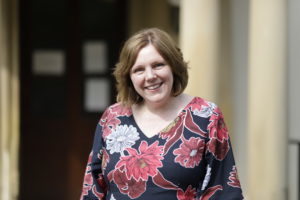Meryl Green is appointed as Principal and CEO of Derwen College in 2019.
In 2019 she also marked 20 years in the specialist education industry and two years at the helm of the specialist further education college.
Over two decades, Meryl has seen many changes at the college which provides vocational training and independence skills to young adults with special educational needs and disabilities (SEND) as well as in the specialist sector. We interviewed her to find out more about her role.
What was your route into specialist education?
I think, like many people who end up teaching, mine was not a direct route. Before teaching, I worked in the design industry for 10 years initially designing textile and ceramic ranges for high street stores like Marks and Spencer and Debenhams and latterly as Design Studio Manager. I joined Derwen College in 1999 when the opportunity to become Head of Arts came up. I was recruited to manage the existing teaching team, and did all my teaching qualifications in-post gaining a PGCE, various SEND qualifications and ultimately a Masters in Educational leadership whilst working full time at Derwen.
The real learning however has definitely been on the job training – my approach to SEND has been shaped by the amazing individuals I have encountered along the way – colleagues from across the sector, inspiring teachers and the students themselves.
What are some of the changes you have seen over 20 years in the sector?
The landscape we work within has changed significantly over the past 20 years. A lot of this change is really positive, in terms of how disability is viewed there has been a real culture shift in many areas. The notion of inclusion within education and in the workplace for example. The language that is used to describe disability is more sensitive and appropriate. There is a more positive portrayal of disability in the media through TV, films, sports and comedy. Our students can now ‘recognise themselves’ in some of the characters they see in their favourite TV shows and even on formats like ‘Britain’s got Talent’ which is fantastic.
However, in contrast, the economic climate has impacted significantly on education as a whole over the last 10 years. Residential specialist providers like Derwen College have been particularly hard hit with young people from out-of-county finding it harder than ever to get funding to come here. Twenty years ago we had a waiting list and our biggest worry was fitting everyone in. We still have high demand for places but parents and young people are put off from applying because they know that they are likely to have to fight a tough battle with their Local Authority for their funding.
The families that have the resources and the resilience to fight generally win at tribunal and eventually come to us but it’s a tough road and not everyone is equipped for the fight. The impact is a perceived loss of choice for this very vulnerable group which, in my opinion, is a real backwards step.
Changes at Derwen College
At Derwen College I have seen so many changes over 20 years as the campus and the curriculum has been adapted to meet the evolving needs of our learners. Fundamentally, we still deliver vocational and independence skills to young people with SEND but the needs of young people has shifted over the years and we have had to move with the times.
Twenty years ago the demographic of our cohort was different. The vast majority of learners had Down’s Syndrome and Moderate Learning Difficulties and were working at Entry Level 3 and above – we still have some of those learners but now our cohort is much more complex and includes Severe Learning Difficulties, Autism with behaviours that challenge and most recently a small PMLD provision. Our learners now are working predominantly at pre-entry level and some have 1-1 support in every session. All programmes of learning are genuinely bespoke to the individual and tailored to achieve the outcomes agreed in their Education and Health Care Plans (EHCP).
Outcomes themselves also vary much more than they did – young people still come to Derwen to learn the skills they need to get a job and live as independently as possible – but now they also come here to develop their social and communication skills, learn how to become independent travellers, how to manage their money, how to self-medicate, direct support staff, develop an electronic CV – the list goes on and on.
As an organisation, we have had to adapt and evolve; we have invested significantly in our campus and resources. In the 20 years I’ve been at Derwen we have built an IT Centre, Food Production Centre, Business Hub and most recently a state of the art hydrotherapy pool which opened earlier this year. We have also invested heavily in staff training to ensure that staff are equipped with the relevant skills for the range of support needs our young people have now.
The best thing about working at Derwen?
I consider myself very lucky to work at Derwen. The job can be stressful at times but on the whole I am happy to come to work each day and I’m not sure that everyone can say that after 20 years!
Because our work is about people, every day is different and that’s what keeps it interesting. My children ask me what I do at work and it’s difficult to describe as there is no typical day. One week I’ll be at a Natspec (association for organisations which offer specialist further education and training for students with learning difficulties and/or disabilities) board meeting with colleagues from across the specialist sector considering key national issues. Another day, I’m having a meeting with a Local Authority about curriculum development and fees and tomorrow I might chair the Student Union Board meeting where we will discuss everything from the food on offer in the Student Union to student social events – never a dull moment.
What is your proudest achievement at Derwen College?
Such a difficult question! I guess the answer I would give Ofsted would be one about outcomes into paid employment – which for Derwen College leavers far exceeds the national average for young people with SEND – and that does make me very proud. However, on a personal level, I am inspired when I see examples of our students giving back to the community – for example our Duke of Edinburgh’s Awards students volunteer in the local community as part of their bronze, silver and gold awards and Performing Arts students go into main stream schools to deliver Art workshops and raise awareness of disability. This is real success to me; young people with SEND not just sitting back and being passive members of society but taking a full and active role; helping to break down barriers, taking control of their lives. At Derwen we aim to develop the whole person during that vital child to adult phase – that’s a job worth doing.
What are the biggest challenges of leadership?
I’m incredibly proud to work at Derwen and mindful of the fabulous heritage the college has. However, like every college, we are having to adapt to survive. The management of change is, without doubt, the biggest challenge we currently face. Colleges are complex organisations and Derwen is no exception – daily we balance priorities across the different aspects of the business – our charitable objectives, the educational provision, the residential provision, the commercial outlets and all the relevant Ofsted, CQC, and health and safety guidance, legislation and compliance that comes with them. The team at Derwen – including Governors, Senior Managers and staff at all levels contribute to our ongoing success – having an honest and mutually respectful relationship with your Governing Body and investing in the right staff team is the key.
What’s still on your ‘To Do’ list at Derwen?
So much! I’ve worked at Derwen for 20 years, originally as Head of Creative Arts, I then progressed into a quality role, spent some time as an Ofsted Inspector and for the past two years have been Principal here – so in some ways I still feel quite new.
Having the overview of the whole organisation is a real privilege and I am part of a close-knit leadership team that really believes in the College vision, mission and values and is striving to make the provision for our learners better than ever.
On the curriculum side – our on-site ‘Premier Inn’ Hotel 751 is a great model that has led to outstanding results in paid employment for our hospitality students – I would like to extend this model to other national employers in different sectors – maybe a supermarket or garden centre chain – also more off-site working to share the expertise of our staff and meet the needs of more young people across the region.
In terms of our residential and independence provision – last month we launched our Agnes Hunt Village appeal – a fundraising drive to raise 1million pounds to renovate the Agnes Hunt bungalow site adjacent to the college. The aim is to provide our students with the highest quality accommodation so that they can develop their independence, personal and social skills in readiness for supported living after college. The project is anticipated to take five years to complete so we have plenty of work still to do in raising awareness and galvanising support.
What are your hopes for the future?
For the FE sector, proper funding so that college leaders can get back to focusing on what learners need, want and deserve, not just worrying about the bottom line all the time.
For parents and prospective students with SEND, to have genuine, well-considered choice of the best provision for them. It should be a fundamental right not a battle and certainly not just the closest, cheapest option.
For Derwen, to be in a position to continue to support young people with SEND to achieve their full potential, whatever that may be for each individual. I think if we keep that in our sights then the future is exciting with many challenges but also opportunities ahead.

